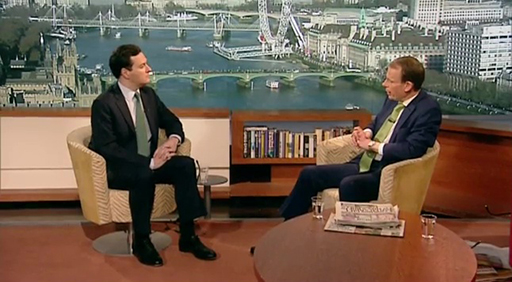2.2.2 Setting Income Tax rates
Watch the UK Chancellor of the Exchequer, George Osborne, being interviewed on the BBC by Andrew Marr. This interview took place in 2012 and debates the cut in the additional rate of income tax (on taxable incomes above £150,000 annually) from 50% to the current rate of 45%.

Transcript
The social and economic backdrop to the issues discussed in the interview are important.
First, taxes (together with state benefits which you look at later in this week) represent an example of the interdependence between the individual and the broader social and economic environment in which they live. Taxation funds state benefits, such as state pensions and social security benefits, and pays for public services such as the National Health Service (NHS).
Second, the UK’s tax and state benefits system also has the effect of some redistribution of income – some of the taxes raised collectively are transferred back to individuals and households. Of course, the people receiving benefits will often be different from those paying taxes such as Income Tax, but many people will pay tax and receive benefits at different stages in their life course. The availability of state benefits is also an important part of the way that people cope with unexpected events, which you’ll examine later in the course.
Who should bear the burden?
What factors does the Chancellor of the Exchequer have to take into account when setting Income Tax rates for low-, middle- and high-income earners?
